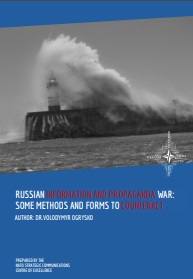RUSSIAN INFORMATION AND PROPAGANDA WAR: SOME METHODS AND FORMS TO COUNTERACT
RUSSIAN INFORMATION AND PROPAGANDA WAR: SOME METHODS AND FORMS TO COUNTERACT
Author(s): Volodymyr Ogrysko
Subject(s): Media studies, Geography, Regional studies, Communication studies, Security and defense, Military policy, Peace and Conflict Studies
Published by: NATO Strategic Communications Centre of Excellence
Keywords: Russia; Ukraine; Crimea; information; propaganda; media; warfare; counteract methods;
Summary/Abstract: Russia’s aggression against Ukraine in the form of the annexation of Crimea and the occupation of Donbas has apart from a military also a powerful informative dimension. The latter is a planned, well-coordinated and well-funded disinformation campaign targeting different audiences. From my point of view and that of other experts of the Centre for Russian Studies, to effectively counteract Russian’s propaganda we must take into account three key factors. First, to clearly identify the audience we are talking about. Second, the messages that Moscow propaganda uses for each audience. Third, the tools the Russian propaganda machine uses for their spread. Within the first factor the Kremlin targets three groups. The first – Russian’s civil society (or what is called “civil society” in Russia). The second – the Ukrainian audience, with particular emphasis on areas occupied by Russians in Ukraine (Crimea and parts of Donbas). The third - the EU and NATO member- states. Obviously, each of Russia’s targets has its own specifics and needs different approaches, forms and methods of research. Only this would allow us to realistically analyze Kremlin’s propaganda and offer practical countermeasures. The limited scope of this article does not allow a thorough analysis of all the factors, hence І will focus only on some of them. According to a survey conducted by the Levada Center in Moscow in March 2015, Russian citizens consider the following three countries (or unions) as main enemies of Russia: the US (73%), the EU (64%) and Ukraine (55%). Instead, “friends” of Russia are Belarus (85%) and China (76%). 50% of Russians believe that Putin acted correctly during his Crimea annexation speech mentioning a possibility to use nuclear weapon. Moreover, 49% believe that Russia’s main foreign policy achievement was its return to the status of “a great power.”
- Page Count: 5
- Publication Year: 2016
- Language: English
- Content File-PDF

